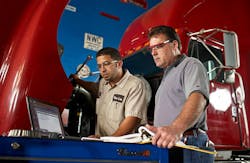While Digital Freight Matching (DFM) companies use digital platforms to match a shipper’s freight with available carrier capacity to better utilize motor carrier capacity, the industry is too complex to become an Uber type of business.
One of the key components of Uber’s model is the commodity-like nature of the ride-hailing service, explains Armstrong & Associates, who released a new report, "Digital Freight Matching – Capturing Technology-Based Efficiencies in the Trucking Industry.”
A&A’s analysis shows the principle behind DFM may be simple, but the trucking industry is not. ”Domestic transportation is not a simple commodity,” Armstrong said.” Complexities arise in the form of specialized equipment types, shipments transported via multiple modes, and necessary exception handling for service issues such as equipment breakdowns. Shipments are high-value and time sensitive. Placing an Uber-like app atop a complex industry doesn’t truly address the problem. Shippers and carriers alike will be disappointed if this is the extent of the ‘solution.’”
DFM apps do however include some of the functionality popularized by Uber – algorithmic pricing, API map integration, track-and-trace, and mobile transactions – along with features specific to trucking, such as trip planning, digital document storage, and TMS integration. But it does account for nuances in the trucking industry.
DFM companies will face several challenges: competition, regulations, investment, possible cannibalization by other emerging technologies, and issues specific to the nature of the trucking industry, including:
• Long-established freight brokers provide exception handling, backup in the case of equipment breakdown, relationship management, access to transportation management systems, and access to a wide variety of carriers. DFM companies are therefore competing against formidable incumbents.
•The ambiguous nature of the sharing economy is both an asset and a liability. While the space sometimes allows circumvention of regulations faced by more traditional industries, it also presents new challenges. Other companies forging the parameters of the Sharing Economy, such as Uber and Airbnb, have encountered policy disputes. Furthermore, as companies operating in this environment face increasing scrutiny, new regulations are also a possibility.
• Digital Freight Matching is just one of many emerging technologies. Innovations like self-driving vehicles and drones will compete with DFM companies or could preempt them entirely.
• The very nature of the trucking industry and the ‘freight problem’ presents their own challenges. On the surface, the problem of freight capacity looks very much like Uber’s problem of available taxi capacity. However, further examination shows the problems have fundamental differences, and DFM success will rely on addressing nuances of the underlying problem.
This technology will continue to grow as DFM has attracted over $180 million in venture capital investment since 2011, including $67 million in 2016 alone.
